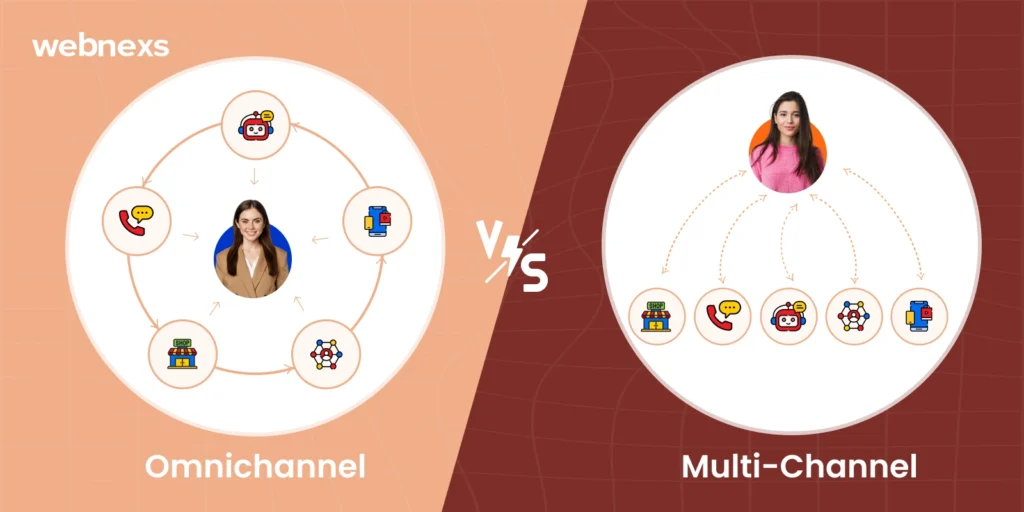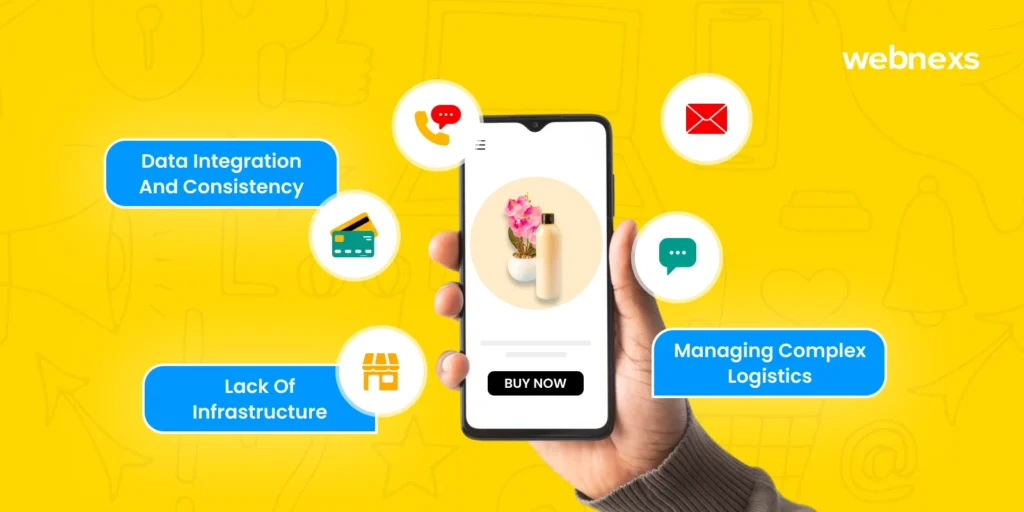Omnichannel e-commerce means selling products through many different places, like websites, apps, and stores.
It gives customers the same experience no matter how they shop. Whether they buy online or in person, everything feels connected and easy.
Today’s consumers don’t just shop in one place. They’re hopping between websites, mobile apps, and even physical stores.
In fact, did you know that 73% of people use multiple channels when shopping?
Sounds crazy, right? But that’s the new normal.
So, here’s a question: How do you keep up with your customers when they’re shopping across so many platforms?
The answer is simple: omnichannel ecommerce platforms.
If you’re a retailer, brand, or ecommerce business, this isn’t just a nice-to-have—it’s a game changer.
Imagine giving your customers a seamless experience no matter where they engage with you. More engagement, better retention, and
Yep! You guessed it—more sales.
In this blog, we’re going to dive into what is an omnichannel ecommerce in detail, why it’s important for your business, and how you can make it work for you.
Ready to unlock new opportunities for your brand? Let’s get into it.
Key Takeaways on Omnichannel Ecommerce Solutions
- Omnichannel ecommerce platform integrates multiple sales channels and offers a unified shopping experience across online and offline touchpoints.
- Omni channel provides valuable insights from various channels, data-driven insights, and personalized marketing strategies.
- Delivers a consistent experience across web, mobile, and in-store interactions. As it increases customer satisfaction.
- Supports business growth and regional expansion without compromising service quality or customer experience.
- Implementing omnichannel strategies may involve challenges like data integration and logistics, requiring careful planning for effective execution.
What is Omnichannel Ecommerce With Example?

Omnichannel ecommerce is a sales strategy that integrates multiple channels like physical stores, online websites, and mobile apps to provide a unified shopping experience across all touchpoints. With the omnichannel ecommerce software, businesses can offer a consistent and personalized experience.
For example, companies like Starbucks use an omnichannel approach to create a seamless customer experience. Their app allows customers to order via mobile, pick up in-store, and even earn rewards regardless of the channel they choose.
This strategy is a great example of how omnichannel commerce platforms integrate both the online and offline experience to boost customer satisfaction.
Omnichannel vs Multi-channel Ecommerce: What’s the Difference?

Research from Salesforce shows that 68% of customers expect brands to interact with them across multiple touchpoints
Multichannel Ecommerce Strategy
Multichannel approach engage the customers across various platforms like physical stores, websites, social media, email, and mobile apps. The main thing to notice here is the channels operate independently, they are not interconnected. The customers can follow you on social media, buy things on your website without any integrations between the channels.
A good example of multichannel ecommerce startegy is Best Buy, where their website and physical stores are disconnected.
In this model, there is no real omnichannel integration between the online and offline experiences.
Omnichannel Ecommerce Strategy
On the other hand, an omnichannel ecommerce platform connects all the channels. With an unified systematic approach customers experience a flawless shopping experience across all touchpoints. Interaction of your customers through any channel will give them the same experience. Implementing an omnichannel strategy is often facilitated by headless commerce solutions, which decouple the front-end and back-end systems for greater flexibility.
An example of successful omnichannel ecommerce strategy is Disney, where online browsing, mobile app, and in-store experiences are tightly integrated to create a unified experience for customers.
Key Differences
| Feature | Multichannel Ecommerce | Omnichannel Ecommerce |
| Customer Journey | Each channel operates independently | Connected, seamless transitions between channels |
| Data Management | Data is separated per channel | Unified customer data across all platforms |
| Customer Experience | Inconsistent across channels | Consistent and personalized across all touchpoints |
| Marketing Strategy | Channel-specific marketing | Cross-channel marketing with consistent messaging |
| Flexibility | Limited flexibility across channels | High flexibility with options to interact anywhere |
What are the Key Benefits of an Omni channel Ecommerce Platform?

Businesses with omnichannel strategies retain 89% of their customers, compared to 33% for those with weak customer engagement strategies
Deeper Customer Insights for Smarter Decisions
One of the primary benefits of headless omnichannel ecommerce management platform is the ability to collect customer data from a variety of channels through customer interactions. Consumer behaviour, preferences, and buying patterns data provides you a lot of insights. So that you can make strategic marketing and targeted promotions to match the customer expectations.
Optimized Customer Journey for Increased Conversions
Omnichannel ecommerce platforms optimize the customer journey. Seamless connection of online and offline experiences tends to provide personalized touchpoints. This unified ecommerce platform improves the conversion rates as the customer’s transition between channels is made easier.
Scalable Growth for Expanding Businesses
An omnichannel ecommerce solution is a scalable solution. It unifies multiple sales channels and integrates the local preferences into the business to provide a consistent brand experience across different regions. Whether entering the USA, UK, Australia, or beyond, omnichannel ecommerce platforms help businesses scale effectively without sacrificing service quality.
Top 3 Challenges You’ll Face With an Omnichannel Ecommerce Platform

A survey by PwC found that 59% of customers say that the quality of customer service is the key differentiator in deciding whether they would remain loyal to a brand
Data Integration and Consistency
One of the biggest challenges with omnichannel ecommerce solutions is the integration of all channels data. Businesses might face confliction in the inventory management, orders and customer behavior without the proper synchronization. It leads you to poor decision making, which causes a frustrating customer experience. Omnichannel ecommerce platforms need to be well-integrated to ensure that all data flows seamlessly.
Managing Complex Logistics and Fulfillment
Seamless coordination is required from warehouses to physical stores. Complex issues in logistics and order fulfillment creates inefficiencies. You can see some misconvenience in buying online, pickup in-store (BOPIS). Managing these services across different locations while maintaining a smooth experience can be tricky. Omnichannel e commerce platforms must offer integrated solutions for inventory management and fulfillment to handle logistics challenges effectively.
Lack of Infrastructure
Many companies find it difficult to integrate the omnichannel ecommerce platforms to their existing systems. Because the business has not been built to handle the demands of a multichannel experience. Upgrading or integrating new infrastructure can be costly and time-consuming, but it’s essential for your businesses to provide a seamless omnichannel ecommerce experience for their customers.
Boost Your Sales with an Omnichannel Ecommerce Platform
Core Elements of a Successful Omnichannel E commerce Platform
These omnichannel technologies have entirely changed the dynamics of the operational aspects of the industry and the way day-to-day processes are carried out. By integrating various systems, a seamless shopping experience is delivered to customers. They have also optimized workflows and the dissemination of information.
1. Integrated Technology Systems
It is an array of interconnected technological stacks that are developed to deliver a unified shopping experience across all channels. This uniformity ensures a seamless operational flow which hugely benefits the end users. Consistency and cohesion are maintained throughout the shopping experience across all platforms.
Components:
i) Customer Relationship Management
According to a 2021 report by Salesforce, 75% of consumers expect companies to provide personalized experiences
A platform to manage, organize, store, and manipulate consumer data across all touchpoints. This software performs tracking of customer behavior, preferences, and purchase history.
Salesforce, one of the largest CRM platforms, allows businesses like Adidas to track customer interactions and tailor personalized shopping experiences across all channels. This leads to higher customer satisfaction and retention.
ii) Enterprise Resource Planning Systems
66% of companies reported that integrating ERP systems into omnichannel operations helped reduce stock discrepancies
It handles back-end processes, including inventory management, order processing, and financial reporting. Inventory levels and order statuses are synchronized across online and offline channels as a result of integration with e-commerce platforms.
Retail giants like Walmart use ERP systems to manage both online and in-store inventory, ensuring they meet customer demand without stock outs or overstocking.
iii) Point of Sale Systems
73% of consumers want to be able to access their purchase history across both online and physical stores
Used in physical stores to process transactions. A modern POS system integrated with other channels can update inventory in real time, manage in-store promotions, and synchronize with online sales data.
Starbucks uses integrated POS systems to offer rewards and promotions seamlessly across both its mobile app and physical stores, ensuring a consistent customer experience.
iv) E-commerce Platforms
45% of ecommerce sales worldwide were driven by omnichannel strategies
It is a virtual storefront that facilitates online shopping and transactions. Integration with allied systems ensures consistency and uniformity from order placement to order fulfillment.
Shopify, a leading ecommerce platform, integrates seamlessly with various POS and CRM systems, helping brands like Allbirds offer a consistent experience both online and offline.
Benefits:
- Automation of processes and data synchronization reduces errors, completes tasks in a time-efficient manner, and enhances operational efficiency.
- A uniform experience is delivered to the customer, making their purchase convenient and time-efficient.
2. Unified Data Management
Data is collected from various sources and centralized to form a cohesive system. This approach ensures data accessibility across all channels and achieves data integrity through a unifying system.
Components:
i) Centralized Database
Companies that effectively manage their data can increase their operational efficiency by up to 30%
Data is stored in a single repository, which maintains a centralized location to ensure data accuracy and provide a single source of truth.
Companies like Amazon leverage centralized databases to maintain comprehensive customer profiles, which helps deliver personalized recommendations and promotions.
ii) Data Integration Tools
Research from IDC suggests that data integration tools help businesses save up to 40% in time spent managing data manually
It performs data collection functions from disparate sources and organizes them into a unified format. These tools are responsible for maintaining data integration and synchronization.
Zapier helps connect apps and automate workflows, enabling businesses to pull data from various systems (like CRM, ERP, etc.) into a unified view for optimized decision-making.
iii) Analytics and Reporting
49% of businesses with integrated data management strategies reported improved customer satisfaction
The stored data is analyzed to make informed decisions and optimize the omnichannel strategy. It provides insights into customer behavior and segmentation, improve your sales performance, and more, all of which can be utilized to enhance operational efficiency.
Target uses advanced analytics to track customer purchasing behavior across both in-store and online platforms to predict future trends and optimize inventory.
Benefits:
- Unified data helps in delivering a uniform and consistent customer experience across various channels.
- Data integrity and accuracy are maintained, allowing for informed decisions in areas such as forecasting, inventory management, consumer trends, and marketing strategies.
3. Consistent Branding
All the channels and touchpoints reflect the brand elements. This helps in building brand recognition and creates a repetition effect.
Components:
i) Brand Identity
According to a study by Lucidpress, consistent branding across all channels increases revenue by up to 23%
Brand color, logo, tone, tagline, and others need to reflect uniformly across all the channels. This enhances brand recognition and makes it easy for the target audience to connect with the brand creating a sense of familiarity.
Nike maintains a consistent brand identity across its website, physical stores, mobile apps, and social media. The use of consistent messaging, colors, and the iconic “Just Do It” slogan helps reinforce its brand.
Benefits:
- The customer base would increase and also help in the retention of existing customers.
- Strong branding works as a differentiation strategy in a competitive market with many players.
Technological Advancement Shaping Omni channel Ecommerce Solutions
1. Centralized and Unified Platform
Companies that integrate their sales channels with a centralized platform see up to a 30% increase in operational efficiency and customer satisfaction
Multiple touchpoints, including the website, app, social media, retail outlets, and others, depending on the technology deployed and the strategies devised for the small business, together form a comprehensive system, forging a cohesive solution for seamless operation.
This consolidated structure allows for a uniform and consistent experience for customers across various touch points.
Handling of data becomes facilitated as data discrepancies can be eliminated to a greater extent as there is only one source of data repository.
This eventually leads to informed decision-making that accurately reflects reality.
In other words, all elements become congruent, allowing operations to function efficiently and deliver a convenient experience to end users.
Nike demonstrates a company that successfully utilizes a centralized platform. They integrate their physical stores, mobile apps, website, and social media into one unified system. This allows them to deliver a seamless experience where customers can browse products online, check in-store availability, and make purchases on any platform. This integration also provides real-time updates and synchronization across all touchpoints.
2. API Interoperability
A 2022 report by MuleSoft found that companies using APIs for interoperability experienced a 40% faster time-to-market for new services
APIs facilitate communication between software platforms and third-party services by enabling data sharing and triggering actions to execute instructions.
They become particularly useful when different applications use various protocols and formats for communication.
To ensure that these differing formats do not hinder interaction, APIs incorporate interoperability features.
This allows diverse systems to work together seamlessly, connecting external services or platforms to enhance overall functionality.
Zalando, an online fashion retailer, uses APIs to connect its ecommerce platform with multiple external services, including logistics, payment gateways, and customer support systems. This integration helps them offer a smooth shopping experience, allowing customers to choose their payment methods, track orders, and receive customer support across multiple touchpoints in real-time.
6 Essential Types of APIs for Omnichannel Commerce
1. Product
Procure access to product details that encompass product, descriptions, images, pricing, inventory levels, and additional functionalities that include product categories, tags, metadata, reviews, and others. All these facilitate the automation of product management that is crucial for the operation of the E-commerce website.
2. Order Management
Organizes and manages the lifecycle of order delivery, from order receipt to tracking, fulfillment, and status updates. This centralized control enables seamless integration with other allied systems such as payment gateways, shipping providers, inventory systems, CRMs, and more.
3. Payment Gateway
It facilitates online payments by integrating the e-commerce platform with payment processors, which secures transactional processes. Additionally, it handles transactions, refunds, and payment verification, and supports various payment methods.
4. Customer Management
User profiles, personal data, order history, and preferences are all managed. The system organizes this analytical data to personalize the shopping experience by creating, updating, and retrieving customer information.
5. Shipping and Logistics
Integrates with freight operators to provide real-time information on shipping rates, generate labels, track shipments, and offer delivery options. Additionally, it integrates with the order management system to streamline the fulfillment process. Also it is essential for the seller onboarding process.
6. Analytics and Reporting
Enables procurement of access to data related to sales, consumer behavior, conversion metrics, traffic sources, website performance, and others. This aids in the generation of reports, tracking KPIs, analyzing trends, detecting anomalies, and others.
3. Social Commerce
27% of global internet users have purchased products directly through social media platforms
Shoppable posts are one of the tools employed to generate leads, allowing users to shop while engaging without leaving the platform, all at the click of a button.
This enables them to shop directly from their social media feed, increasing efficiency by streamlining the online shopping process.
Additionally, there is a feature called Social Listening, which analyzes textual conversations of users to gain deeper insights into user preferences, feedback, and marketplace trends.
This analysis can aid in projecting growth and guiding future developments to enhance revenue.
Instagram is a leading platform for social commerce, enabling businesses like H&M to set up shoppable posts. This allows users to tap on an image to directly view product details and make purchases.
4. Voice Commerce
A study by Juniper Research predicts that the global voice commerce market will reach $80 billion by 2026
Using devices like Alexa and similar assistants, online shopping can be performed using only voice commands.
The system responds to input by generating content that matches server information and quickly processes it to deliver the output instantly.
From product discovery and transaction processing to order tracking, all components of a purchase are entirely operated by voice commands, offering a seamless voice commerce experience.
Sephora integrates voice commerce into their omnichannel ecommerce strategy by allowing customers to order via voice assistants like Amazon’s Alexa, blending convenience with the shopping experience.
5. Blockchain Technology
53% of executives in the retail sector believed that blockchain technology could have a “transformational” impact on supply chain transparency and customer trust
It is an online ledger that transparently records transactions. Biased processing of transactions cannot occur, as the processes are secured and information is tracked reliably. A notable feature distinguishing this technology is its immutability, ensuring that data is tamper-proof.
Walmart has implemented blockchain technology to track the origin of food products in its supply chain. By using blockchain, customers can scan a QR code on a product to view its journey from farm to store. This transparency builds trust and ensures the authenticity of the product, making it a valuable tool for customers seeking reliability, especially in the food sector.
Top Systems and Technologies You Need for Omnichannel Ecommerce Success
Operating an omnichannel e-commerce platform requires a wide array of systems and technologies to ensure that functions are efficiently optimized and that a seamless shopping experience is delivered. These systems create a comprehensive ecosystem, where each component depends on the others to deliver the final output. Each system has its own flagship software vendor and they can be leveraged for optimum functioning of the system.
1. Content Management Systems (CMS)
It primarily manages product information and website content. These systems facilitate a seamless and intuitive shopping experience, ensuring that users can navigate the site effortlessly. Essentially, they craft a platform that drives traffic through a visually appealing and user-centric interface.
Industry-leading CMS vendors
1. WordPress
Currently, it powers 40% of all live websites hosted. This widespread adoption is driven by its open-source platform, which allows its source code to be accessed and modified by users for further enhancements. Its flexibility in adapting to the requirements of various types of websites has contributed to its large market share. Additionally, its extensive plugin archive supports ongoing websites by accommodating various modifications as needed to address the dynamic demands of the market.
2. Drupal
It is distinguished by its scalability and is structured to handle high loads, made possible by well-designed load-balancing techniques. As a result, it offers advanced traffic handling performance, demonstrating its responsiveness and efficiency. Moreover, it supports advanced content structuring for increased content management efficiency.
3. Joomla
Its success is primarily attributed to its USP which is flexibility and ease of use. This degree of versatility has given it an edge over its competitors and has enhanced visibility in the market. It does not demand for sophisticated knowledge but limited technical knowledge is sufficient. The extensivity it offers can be utilized to its maximum to manage and organize content effectively and efficiently.
4. Kentico
It is a unique system that provides an all-in-one solution by combining CMS operations with digital marketing functionalities. As a result, the complexities associated with managing multiple systems and technologies are drastically reduced, saving time through streamlined operations.
5. Contentful
It is a cloud-based CMS that offers a advanced content infrastructure to create, manage, and distribute where the front-end is decoupled from the back-end system for increased flexibility. It adopts a headless technology for optimized performance of omnichannel content delivery which ensures uniform and consistent experience across various digital interfaces. This is ideal for evolving content requirements.
2. Customer Relationship Management(CRM)
It is a system that enables communication with potential and existing customers by managing all processes from customer interaction to integration for unified data access. Its direct effect on sales growth is evident as it explicitly reflects the brand personality. The scope is not limited to sales but also extends to customer retention operations. Optimization of all these processes will aid in increasing customer satisfaction, which signals a positive reason to continue using the system.
Industry-leading CRM vendors
1. Salesforce
One of the widely used cloud-based CRM worldwide, known for its comprehensive feature set comprising various tools for various touchpoints to enable seamless customer rapport. Every customer-centric operation is carefully curated by integrating functionalities into a unified platform for facilitating the management of customer relationships and business processes.
2. Microsoft Dynamics 365
One of the distinguishing features of ecommerce website is the capability to customize solutions based on user requirements, all within a single, integrated system. Their exclusive suite of applications enables integration with the other components in the ecosystem seamlessly which enhances functionalities on a wholesome basis to derive the most optimum performance from the software platform.
3. HubSpot CRM
This cloud-based platform can be availed of the free version which saves a lot of upfront costs, after getting accustomed to the platform, scaling up can be easily done to facilitate further growth. It stands out with its user-appealing and navigable interface, automation of repetitive tasks, and advanced analytics, all of which give it an edge over other vendors, all of which facilitate streamlining of workflows. Budding firms can leverage this platform and scale up to the requirements arising in the future, as this is a future-proof platform, upscaling and descaling can be seamlessly integrated into other systems.
4. Zoho CRM
It offers a comprehensive suite of tools unified together to facilitate managing sales, marketing, customer interactions, and support activities. It can be coupled with other Zoho applications for a seamless flow of work and data sharing for informed decision-making. Affordability makes this unique in the industry among its top-tier competitors.
5. Pipeline CRM
The software has been narrowed down to focus on sales where all components from lead management, sales funnel visibility, automation of tasks, and various others. One of the exclusive stand-out features is the visual pipeline management, which enables one to view the sales process offering a comprehensive visibility to track and modify operations with utmost clarity to improvise on the sales functions to ensure optimum performance.
Related: Single vendor vs multi vendor ecommerce marketplaces
3. Cloud Computing
It utilizes the internet to share resources such as storage, databases, processing power, and networking, all of which require no physical data centers and servers to host the services. This mode of obtaining services has immense benefits to offer in terms of flexibility, scalability, cost-efficiency, and faster development services.
Industry-leading cloud vendors
1. AWS
The Amazon Simple Storage Service (S3) stands out for cloud storage, offering scalability for businesses of all sizes. It is well-regarded for its durability, alongside advanced capabilities for data processing and transformation.
2. Microsoft Azure
Azure’s cloud object storage provides a powerful mix of scalability, flexibility, enhanced data protection, data lake optimization, and comprehensive data management tools, catering to the evolving requirements of businesses.
3. Google Cloud
With features such as fast data transfer, flexible object storage management with detailed reporting, customizable data security, and more, Google Cloud is an ideal platform for streamlined data management.
4. IBM Cloud
IBM Cloud excels with features like accelerated data transfer, immutable data retention, automatic safeguards against accidental data deletion, and other advanced functionalities, ensuring secure and reliable data management.
5. Oracle Cloud
Oracle Cloud offers versatile storage options, seamless accessibility, and automatic scalability for fluctuating workloads, along with other capabilities, making it a flexible and efficient solution for managing data.
4. Payment Gateways
It facilitates online payment which includes handling payment details, and transferring payment from the user’s account to the merchant’s account all while ensuring data and money is handled with utmost security to enable a smooth experience. The optimum vendor is selected after critically examining various aspects of compatibility such as APIs, software versions, and others, which may cause functionality problems interfering with the seamless operation of the enterprise e-commerce platform.
Industry-leading payment gateway vendors
1. Stripe
It is distinguished by its wide option of payment methods, extensive range of customization options it offers, and advanced fraud prevention tools. These dynamic features make it a versatile option to consider.
2. PayPal
Being the widely used payment gateway, it is known for its ease of integration across various e-commerce platforms, websites, and applications. It also adopts stringent security measures to ensure absolute protection of data.
3. Square
It primarily caters to multiple transaction requirements and one of its notable features for multivendor is integrated to point-of-sale systems for optimizing seamless transaction processes which makes management of sales and inventory straightforward.
4. Authorize.Net
Its advanced security features enable secure transactions while also protecting sensitive customer details. They have proven to be a reliable payment partner over the years with a dynamic customer support team that has enabled them to build credibility in the market.
5. Braintree
It offers a comprehensive payment processing solution, supporting various payment methods from plastic money to digital wallets. This versatility allows it to scale up to cater to a wide variety of customers requiring payment gateways.
6. Cryptocurrency Payment
Cryptocurrency payment methods are gaining momentum as an alternative way to process transactions in the ecommerce microservices architecture. By accepting digital currencies such as Bitcoin, Ethereum, or others, businesses can offer more flexibility and reduce reliance on traditional payment gateways.
Boost Your Sales with Convenient Payment Options
5 Common Myths About Omni channel Ecommerce Solutions You Need to Know
1. People often believe that omnichannel simply means having a presence across various channels, including brick-and-mortar stores, online storefronts, and social media. However, omnichannel is about more than just existing on multiple platforms. It involves ensuring that these channels are well connected to deliver a consistent and seamless experience, thereby enhancing user convenience and ensuring time efficiency.
2. The cost associated with establishing an omnichannel e-commerce platform is often presumed to be high. While integrating various systems involves additional costs, the long-term benefits make the investment worthwhile despite the initial setup expenses.
3. The general notion that omnichannel e-commerce is suitable only for enterprise-level businesses is misleading. Businesses of any size can adopt this strategy by initiating and optimizing data synchronization.
4. This is not a set-up and halt strategy, instead, it requires ongoing management and optimization of the system to ensure seamless user experience across all channels.
5. Strategy need not be implemented in one go; instead, a modular approach can be incorporated. This increases flexibility in practically executing the strategy as and when required to meet business specifications.
Conclusion
The right omnichannel ecommerce platform boosts your revenue within 6 months.
Focus on long term goals like building a seamless customer experience or loyalty with the customers.
Invest in a powerful omnichannel platform to meet up with your customers expectations.
Next Step: Start by analyzing your current systems, identifying pain points, and exploring platforms that align with your goals. Reach out to providers for demos and guidance.
If you need help, talk to our experts right now!
Atlast, tell us how do you plan to integrate multiple channels into your business for a seamless experience?





9 Responses
I’m looking to start a niche based ecommerce startup and and need to provide personalized customer experience on all the channels. Can you please fetch me more details about your ecommerce platform building services with an integrated omnichannel ecommerce solution.
I’m in interested of omnichannel ecommerce solution to enter into international markets. Also in need of multi language and multi currency support across platforms.
I currently sell only on Amazon and Flipkart. I want to build my own branded website while still keeping marketplace sales and integrate with my newly building website.
We’re a small team with limited resources but big ambitions to grow across channels. Is your omnichannel solution cost effective for startups?
We want to improve our customer journey across channels especially with personalized offers. How does your omnichannel ecommerce solution support customer retention and loyalty?
We are facing issues with order syncing between our website and marketplace listings. Does your omni channel ecommerce platform offer real time order and inventory updates to solve this?
I’m a tech lead at a startup and we are considering an omnichannel ecommerce approach. Do you offer APIs or SDKs that help us integrate your platform with our existing CRM?
I have been running a D2C brand online for a year and now want to expand to marketplaces and physical pop up stores. How flexible is your omnichannel software is to across these different sales channels?
Hi, I’m interested in developing a online store with the integration of omni channel ecommerce platform. May I know more about your services?